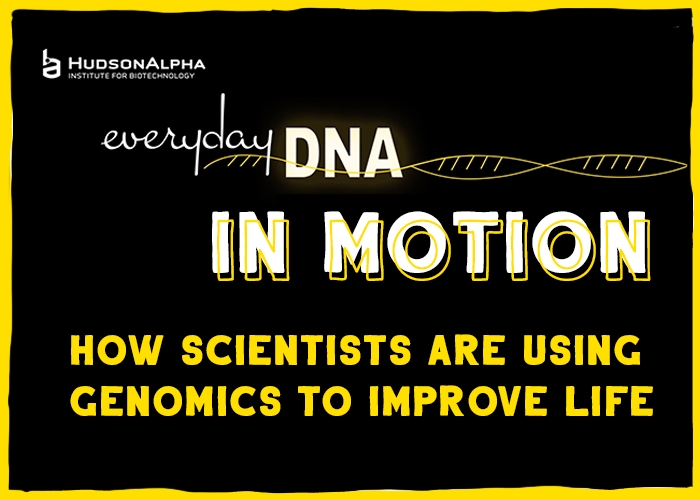Huntsville, Ala. — The HudsonAlpha Institute for Biotechnology, a nonprofit genomics and genetics research institute in Huntsville, Ala., met with Alabama lawmakers today in Montgomery, Ala. to kick off Alabama Rare Disease Week.
Alabama Rare Disease Week is held in conjunction with Rare Disease Day, an international celebration that takes place on the last day of February each year. On and around this day, hundreds of patient organizations from around the world hold awareness-raising activities. Swapna Kakani, a rare disease patient and advocate, serves as the state leader for Alabama Rare Disease Week.
“I look forward to bringing awareness to the almost 50,000 individuals with rare diseases in Alabama on our second annual Rare Disease Day State House Event. We all may have unique diseases with different physical symptoms, but we share the same struggles. Families across the state are uniting as a rare community to grow awareness about rare disease and the needs of patients and families. Alabama is fortunate to have innovative medical institutions and universities in it’s backyard; with a united front, we can unite as Alabama Rare and make a difference. Alabama can and will be a model for the rest of the country,” said Kakani.
The three-day series of events began today when HudsonAlpha leaders, rare disease advocates, and families struggling with rare disease met with Alabama lawmakers to discuss their challenges, and new ideas that would potentially improve quality of life for rare disease patients.
“There are millions of people living with rare and undiagnosed diseases in this country. HudsonAlpha now has the tools and the team to improve the rate of diagnosis, which is the first step in providing a treatment,” said Howard Jacob, PhD, executive vice president for genomic medicine at HudsonAlpha. “Our role in Rare Disease Week is to become a medical resource for rare disease patients, and even more importantly, to become a linchpin in a new effort to unite the rare disease community across Alabama.”
In addition, Alabama rare disease advocates Kristin Anthony and Scott Griffin will head to Capitol Hill to encourage better health policy for rare disease patients in the state. Kristin is a resident of Huntsville and has Cowden syndrome, a rare disease that is part of PTEN hamartoma tumor syndrome. She established the PTEN Hamartoma Tumor Syndrome Foundation and has gone to Washington, D.C. for rare disease week multiple years in a row. Scott has an 11-year-old son, Gabe, who was born with Duchenne muscular dystrophy syndrome (DMD), the most common fatal genetic disorder diagnosed in childhood. You can read his story at hopeforgabe.org/.
HudsonAlpha collaborators Children’s of Alabama and the University of Alabama at Birmingham (UAB) will also host Rare Disease Week events.
The “Beyond the Diagnosis” art exhibit and reception will take place Thursday, March 2, 5-7 p.m. in the Bradley Lecture Center at Children’s of Alabama. The exhibit will feature paintings of children from all over the U.S. who have rare diseases.
To wrap up Alabama Rare Disease Week, the 4th annual Rare Disease Genomics Symposium will take place Friday, March 3, 8-3 p.m., also in the Bradley Lecture Center. This year’s symposium, “Genetics and Genomics in Day to Day Medical Practice,” will include presentations from HudsonAlpha’s David Bick, MD; Tom May, PhD; and Whitley Kelley. You can register and download the agenda at childrensal.org/genetics.
To learn more about how HudsonAlpha, Children’s of Alabama and UAB are ending the diagnostic odyssey, check out the following video about one of the first patients diagnosed through the Clinical Sequencing Exploratory Research Program.
About HudsonAlpha: HudsonAlpha Institute for Biotechnology is a nonprofit institute dedicated to innovating in the field of genomic technology and sciences across a spectrum of biological challenges. Opened in 2008, its mission is four-fold: sparking scientific discoveries that can impact human health and well-being; bringing genomic medicine into clinical care; fostering life sciences entrepreneurship and business growth; and encouraging the creation of a genomics-literate workforce and society. The HudsonAlpha biotechnology campus consists of 152 acres nestled within Cummings Research Park, the nation’s second largest research park. Designed to be a hothouse of biotech economic development, HudsonAlpha’s state-of-the-art facilities co-locate nonprofit scientific researchers with entrepreneurs and educators. The relationships formed on the HudsonAlpha campus encourage collaborations that produce advances in medicine and agriculture. Under the leadership of Dr. Richard M. Myers, a key collaborator on the Human Genome Project, HudsonAlpha has become a national and international leader in genetics and genomics research and biotech education, and includes more than 30 diverse biotech companies on campus. To learn more about HudsonAlpha, visit: http://hudsonalpha.org/.
HudsonAlpha Media Contact:
Margetta Thomas
mthomas@hudsonalpha.org
256-327-0425


